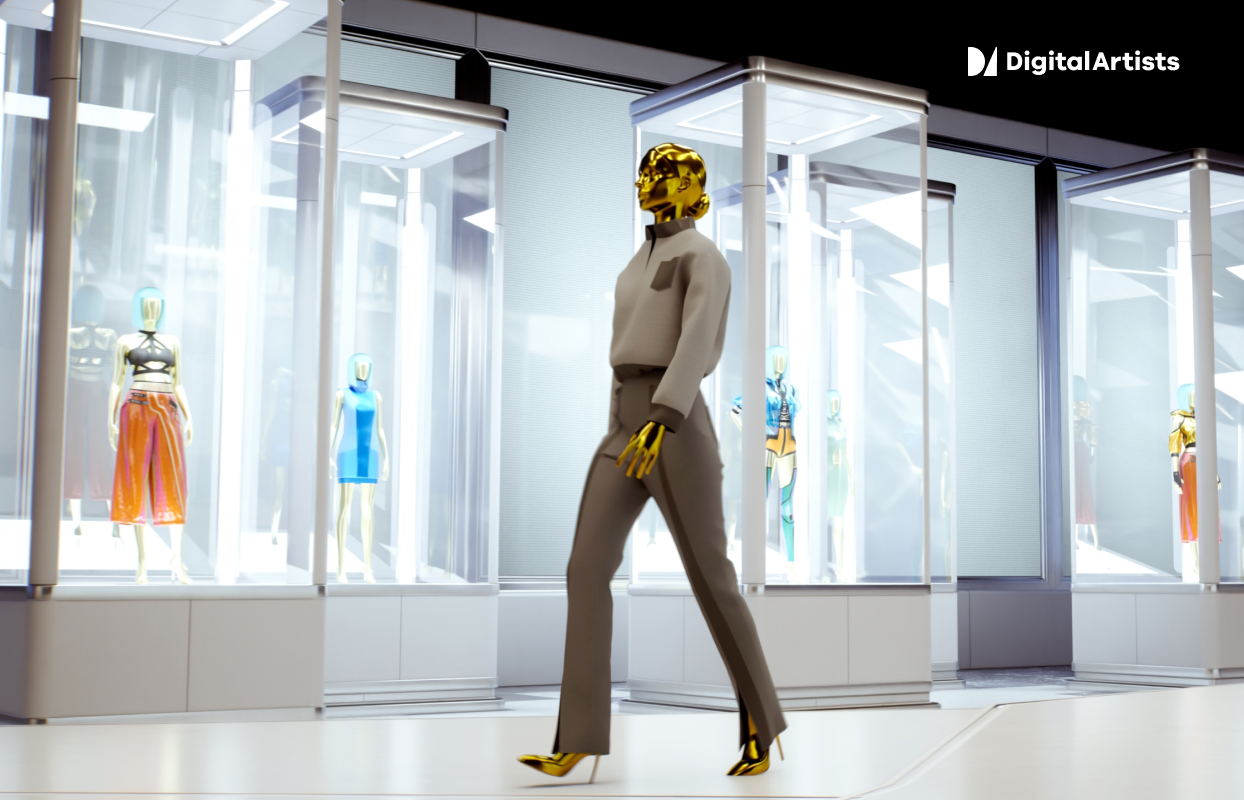


In the dynamic realm where fashion and technology converge, a groundbreaking phenomenon has emerged, captivating both creators and consumers alike: NFTs in the fashion business. Non-Fungible Tokens (NFTs) have pioneered a digital revolution, fundamentally altering how ownership and value are perceived in the virtual domain. Now, this trend is sweeping through the fashion industry, introducing an entirely new dimension to the way fashion is created, consumed, and cherished.
NFTs in the fashion business encompass the tokenization of fashion items, offering a revolutionary approach to ownership and authenticity. By converting tangible and intangible fashion assets into unique digital tokens on blockchain platforms, fashion brands and NFTs are rewriting the rules of engagement. This innovation not only empowers designers to showcase their creative prowess through virtual designs but also reshapes the way consumers connect with fashion, blurring the lines between physical and digital experiences.
Within this transformative landscape, businesses are presented with unprecedented opportunities and challenges. By embracing NFTs in the fashion industry, the brands foster deeper connections with their audience, explore novel revenue streams, and navigate the uncharted waters of digital ownership. Yet, the adoption of NFTs also raises questions about sustainability, intellectual property rights, and the democratization of fashion.
This introductory exploration delves into the realm of NFTs in the fashion business, shedding light on the potential for disruption and innovation while navigating the complexities that businesses must navigate to capitalize on this digital fashion frontier.
In the rapidly evolving landscape of digital innovation, Non-Fungible Tokens (NFTs) have emerged as a transformative force, revolutionizing the very concept of ownership, value, and authenticity. At their core, NFTs represent a pioneering fusion of blockchain technology and creative expression, offering a new paradigm for tokenizing unique assets in the digital realm.
Unlike cryptocurrencies such as Bitcoin or Ethereum, which are interchangeable and hold identical value, NFTs are distinct and irreplaceable digital tokens. Each NFT is embedded with a unique set of data that confers individuality and ownership over a specific digital item, be it artwork, music, videos, virtual real estate, or even moments in time. This individuality is made possible through the use of blockchain, a decentralized and tamper-proof digital ledger that ensures the provenance and scarcity of the asset.
The mechanics behind NFTs are underpinned by smart contracts, self-executing protocols that dictate the terms of ownership and distribution. These contracts encode the rules that determine how the NFT can be transferred, replicated, and monetized. This empowers creators to define how they want their digital creations to be experienced and monetized even after they have been sold.
The appeal of NFTs lies in their ability to confer a sense of true ownership and uniqueness in the digital realm, addressing the longstanding challenge of digital piracy and replication. Artists, musicians, and content creators can now tokenize their works, ensuring that each piece remains distinct, traceable, and valuable in the eyes of collectors and enthusiasts. The NFT marketplaces that have sprung up facilitate the buying, selling, and trading of these tokens, transforming the way we perceive, value, and trade digital assets.
This introductory exploration embarks on a journey to demystify the world of NFTs, delving into their core mechanics, applications, and implications. From the explosion of digital art and collectibles to the redefinition of ownership in the metaverse, this exploration seeks to illuminate the revolutionary impact of NFTs on the intersection of technology, creativity, and commerce.
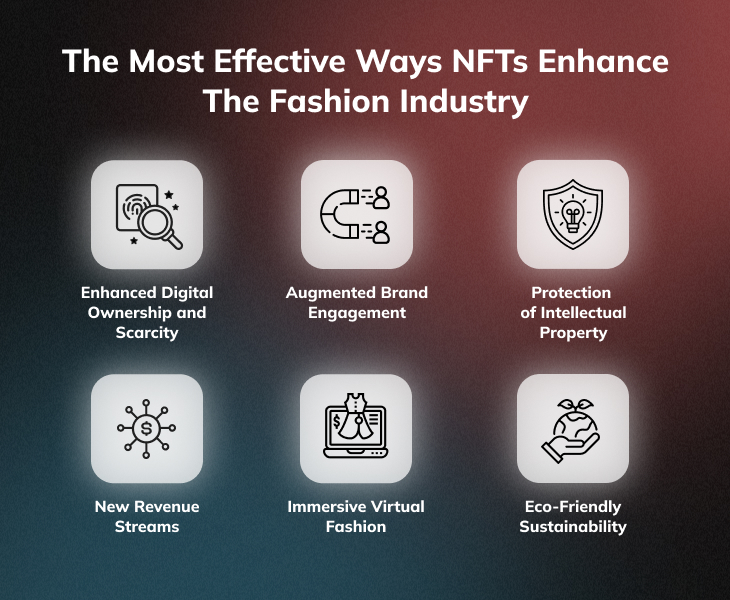
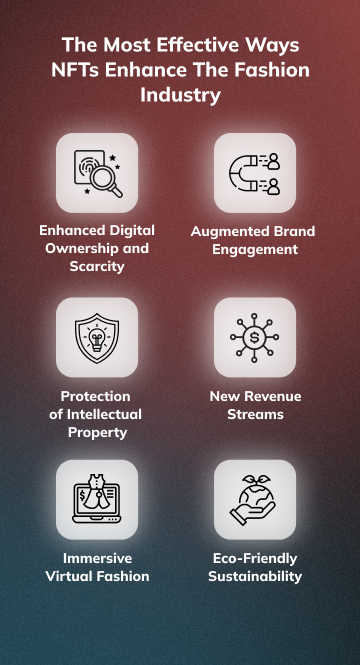
The integration of fashion NFTs improves the business landscape for many fashion brands and has sparked a wave of innovation and transformation. Beyond their application in art and entertainment, NFTs are redefining the fashion industry by introducing novel ways of engaging with consumers, elevating brand value, and reshaping the ownership and authenticity of fashion items. This exploration delves into the myriad benefits that NFTs bring to the world of fashion, revolutionizing the way brands connect with their audience and paving the path for an immersive and dynamic digital fashion experience.
NFTs provide a solution to the digital replica challenge in fashion. By tokenizing exclusive designs, limited editions, or even virtual outfits, brands can imbue their creations with authenticity and scarcity. This establishes a tangible sense of ownership for consumers in the digital space, fueling the desire to collect unique pieces that hold cultural and aesthetic value. NFT meaning in fashion signifies this paradigm shift, granting value through ownership.
Fashion NFTs introduce diverse monetization avenues. Fashion brands can sell digital access directly to collectors, offering digital garments as NFTs. Moreover, fashion houses can receive ongoing royalties each time an NFT changes hands, enabling them to benefit from the secondary market as well. This taps into a previously untapped revenue stream, altering the traditional fashion business model. NFTs opens doors for fashion designers to innovative income sources.
NFTs amplify brand engagement by transforming passive consumers into active participants. Brands can host NFT drops, auctions, and competitions, fostering a vibrant community around their digital fashion offerings. This interaction creates a sense of exclusivity and anticipation, aligning with modern consumers’ craving for unique experiences.
NFTs pave the way for virtual fashion experiences within the metaverse. Consumers can dress their avatars in branded virtual outfits, enhancing brand visibility in virtual worlds and online communities. This bolsters the brand’s digital presence and resonates with the growing trend of individuals seeking to curate their online personas.
NFTs establish a digital footprint for fashion designs, enhancing intellectual property protection. The blockchain’s transparent and immutable nature ensures a verifiable record of origin, deterring counterfeiters and protecting the brand’s creative integrity. This level of security resonates with brands looking to safeguard their legacy in a rapidly digitizing industry.
NFTs can contribute to the fashion industry’s sustainability efforts. As virtual fashion eliminates the need for physical production, transportation, and waste, it reduces the carbon footprint associated with traditional fashion practices. NFTs enable brands to experiment with innovative, environmentally conscious approaches that align with evolving consumer values.
In conclusion, NFTs have initiated a seismic shift in the fashion business landscape, presenting an array of transformative benefits. By endowing digital assets with true ownership, facilitating new revenue streams, nurturing engagement, fostering virtual experiences, protecting intellectual property, and promoting sustainability, NFTs empower fashion brands to embrace the digital age and engage consumers in unprecedented ways. As the world of fashion continues to evolve, the integration of NFTs stands as a revolutionary bridge between creativity, technology, and commerce, propelling the industry into a dynamic and immersive digital future.
The utilization of Non-Fungible Tokens (NFTs) as a growth strategy within the fashion industry is emerging as a dynamic and transformative trend. Businesses are harnessing the unique attributes of NFTs to elevate their fashion brands, fostering innovation, authenticity, and engagement.
NFT fashion offers a novel approach to marketing and brand expansion. Fashion brands can create limited-edition digital assets, tokenizing exclusive designs or virtual clothing items. These NFTs become collectible items, attracting a dedicated fan base that seeks unique experiences and virtual ownership. This engagement translates into increased brand loyalty and exposure, amplifying the brand’s reach within digital communities and metaverses.
Moreover, NFTs enable collaborations that transcend the boundaries of the physical world. Fashion brands can partner with digital artists, influencers, and creators to develop NFT collections that encapsulate the brand’s ethos while tapping into the influencers’ online following. This synergy expands the brand’s audience and establishes connections with communities that are deeply engaged in the digital realm.
In the realm of sustainability, NFTs provide an avenue for eco-conscious branding. Brands can tokenize sustainable collections, highlighting their commitment to ethical practices and responsible production. This resonates with consumers who prioritize environmentally friendly choices, further establishing the brand as a leader in sustainable fashion.
The concept of NFT for fashion amplifies these possibilities, catalyzing an innovative fusion of technology and style that propels the industry into a new era of creative exploration and sustainable consciousness.
While the potential for growth is vast, challenges do exist. Navigating the intricacies of NFT technology, ensuring consumer trust in authenticity, and addressing environmental concerns related to blockchain networks demand careful consideration.
Fashion NFT projects, including the innovative concept of an NFT fashion show, are redefining the industry by marrying art, technology, and style. These groundbreaking initiatives tokenize unique fashion pieces, granting collectors verifiable ownership and enabling creators to expand their reach. Fashion NFTs transcend physical limitations, offering digital wearables that reflect personal identity and creativity.
This new landscape fosters collaborations between designers and digital artists, birthing innovative styles. As the NFT ecosystem continues to flourish, fashion projects pave the way for a dynamic future where self-expression, virtual fashion, and blockchain converge, reshaping how we perceive and engage with clothing and art.
In conclusion, NFTs are forging a path for fashion brands to reimagine growth strategies. By embracing digital ownership, fostering collaborations, and aligning with sustainable values, businesses can unlock new dimensions of engagement, attract diverse audiences, and position themselves at the forefront of fashion innovation. As the fashion landscape evolves, NFTs stand as a powerful tool for shaping brand narratives and propelling growth into the digital age.
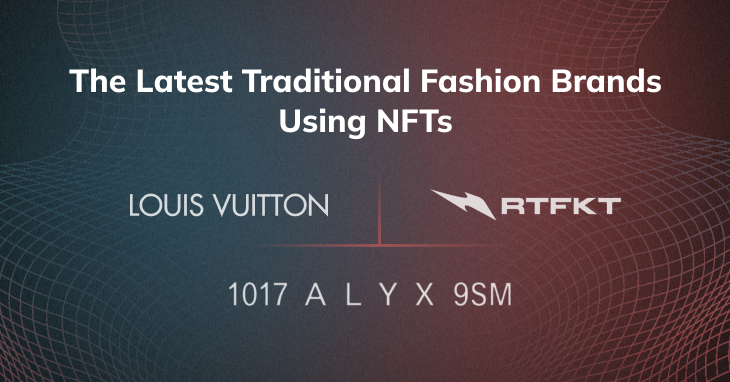
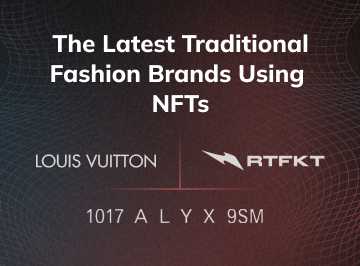
In a bold leap into the future, pioneering fashion companies have harnessed the potential of Non-Fungible Tokens (NFTs) in reshaping the landscape of fashion. These trailblazing NFT fashion brands, along with the emergence of events like NFT fashion week, offer unique digital creations, limited edition collections, and unparalleled engagement opportunities.
As innovators at the intersection of fashion and technology, they set a precedent for the industry, unveiling a realm of possibilities that extend beyond the physical realm and redefine the relationship between creators, consumers, and their beloved fashion pieces.
Gucci, a globally acclaimed luxury fashion brand synonymous with sophistication and innovation, has ventured into the world of Non-Fungible Tokens (NFTs) to redefine the boundaries of fashion and technology. In a move that highlights their commitment to pushing creative boundaries, Gucci introduced a limited-edition virtual sneaker collection known as “Gucci Virtual 25.”
With this pioneering step, Gucci bridged the gap between the physical and digital realms, allowing customers to purchase exclusive digital sneakers as NFTs. These digital shoes, while intangible, could be worn within virtual environments, underlining the brand’s ingenuity in crafting a unique fusion of fashion and virtual reality.
https://www.coindesk.com/video/nfts-go-high-fashion-gucci-partners-with-christies-on-new-collection/
Gucci’s foray into NFTs represents their acknowledgment of the evolving landscape of fashion consumption and the growing influence of digital experiences. The “Gucci Virtual 25” collection not only catered to the digitally engaged audience but also showcased the brand’s ability to adapt and innovate in the face of changing consumer preferences.
By embracing NFTs, Gucci demonstrated their commitment to remaining at the forefront of technological trends while maintaining the luxury and exclusivity that define their brand identity. This strategic move not only exemplifies Gucci’s dedication to artistic experimentation but also solidifies their posPrada’s NFTs: Bridging Luxury Fashion with Digital Art<ition as a visionary within the fashion industry, setting a precedent for other luxury brands to explore the intersection of fashion and digital art through NFTs.
Prada, a prominent name in the world of luxury fashion, has embarked on an innovative journey by embracing Non-Fungible Tokens (NFTs) as a medium of creative expression. Collaborating with artist Christophe Chemin, Prada introduced an exclusive NFT collection that transcends the traditional boundaries of fashion and art.
This collaborative effort resulted in a collection of digital artworks that were auctioned off as NFTs. Through this groundbreaking initiative, Prada provided collectors and enthusiasts with the opportunity to own a piece of their creative vision in the digital realm. This move not only showcased Prada’s ability to adapt to emerging technological trends but also demonstrated their commitment to engaging with a digitally-savvy audience.
By issuing NFTs, Prada reimagined their brand as an entity that extends beyond physical products, embracing the intangible yet impactful nature of digital art and collectibles. This endeavor aligned perfectly with Prada’s legacy of pushing artistic boundaries and elevating their brand presence to new dimensions.
Prada’s exploration of NFTs underscored their willingness to experiment with new forms of engagement and ownership. Through this initiative, they became the NFT fashion brand that positioned themselves at the intersection of luxury, art, and technology, setting a precedent for the integration of NFTs within the fashion landscape. In doing so, Prada not only demonstrated their capacity to evolve with the times but also solidified their reputation as a trailblazer in the ever-evolving world of fashion and digital innovation.
Louis Vuitton, an iconic symbol of luxury and elegance, has boldly embraced the world of Non-Fungible Tokens (NFTs) to create a harmonious fusion of fashion and digital artistry. Collaborating with renowned digital artist Beeple, the brand introduced a groundbreaking NFT collection, “Louis Vuitton x Beeple: The First Ever NFT Drop from LV.”
This historic collaboration marked Louis Vuitton’s entry into the NFT space, showcasing their innovative approach to redefining the boundaries of luxury and creativity. The collection, auctioned on a blockchain platform, featured unique digital artworks that blended Beeple’s distinctive style with Louis Vuitton’s legacy of opulence.
By issuing NFTs, Louis Vuitton not only ventured into a realm of digital ownership but also bridged the gap between traditional craftsmanship and cutting-edge technology. This foray into the digital art world not only underscored their adaptability but also demonstrated their commitment to engaging with a modern and tech-savvy audience.
Louis Vuitton’s exploration of NFTs reflects their capacity to navigate the intersection of art, fashion, and digital innovation. By collaborating with a visionary like Beeple, the brand showcased its ability to evolve with the times and remain a pioneer in the luxury fashion landscape. This initiative not only cemented their status as a trailblazer but also opened up new possibilities for the integration of NFTs in the world of luxury fashion and artistic expression.
Alyx, an avant-garde fashion brand known for its innovative designs, has ventured into the realm of Non-Fungible Tokens (NFTs) to redefine the relationship between fashion and the digital world. Their approach involves issuing NFTs that transcend traditional fashion items, introducing a new dimension of interaction and ownership.
Alyx’s NFTs extend beyond physical garments, offering customers the opportunity to own and display virtual accessories and garments in digital environments. This unique approach not only aligns with the growing trend of virtual self-expression but also positions Alyx at the forefront of the digital fashion revolution.
By introducing NFTs, Alyx has transformed the concept of fashion ownership into a virtual experience, allowing consumers to curate their digital identities in innovative ways. This initiative speaks to the brand’s dedication to pushing boundaries and embracing technological advancements, while maintaining a strong connection to their fashion-forward identity.
Alyx’s foray into NFTs is a testament to their ability to evolve and adapt to the changing dynamics of the fashion industry. By integrating digital assets into their repertoire, they are shaping the narrative of fashion consumption in the digital age, making a significant impact on the way we perceive and engage with fashion in both physical and virtual realms.
RTFKT Studios stands as a pioneering force in the fashion industry’s digital transformation, epitomizing the innovative fusion of fashion and technology. This avant-garde brand has distinguished itself by exclusively issuing Non-Fungible Tokens (NFTs) for its striking array of virtual sneakers, garments, and accessories.
Through their NFT-centric approach, RTFKT Studios offers consumers a unique opportunity to own and exhibit virtual fashion items that transcend the constraints of the physical world. Their digital designs cater to the burgeoning virtual fashion landscape, where these NFT-enabled pieces can be worn and displayed within digital environments, blurring the lines between reality and the metaverse.
By issuing NFTs, RTFKT Studios empowers fashion enthusiasts to engage in self-expression that extends beyond physical limitations. Their approach opens up innovative avenues for personalization and style within virtual spaces, redefining how fashion is both perceived and experienced.
RTFKT Studios’ pioneering stance showcases their commitment to pushing boundaries, fostering creativity, and embracing the ever-evolving nature of fashion. Their NFT-centered business model places them at the forefront of a digital fashion movement, where innovation, technology, and style intersect in unprecedented ways. This approach not only caters to the digital-savvy consumer but also serves as an inspirational case study for the fashion industry’s ongoing evolution toward a more immersive, digital future.
The advent of Non-Fungible Tokens (NFTs) has heralded a profound transformation in the fashion industry, impacting various facets. In the context of “Virtual Fashion in Virtual Worlds,” NFTs have introduced an unprecedented fusion of digital art and fashion, with collaborations between traditional designers and digital artists. NFT fashion brand is at the forefront of this evolution.
NFTs are also reshaping the landscape of secondhand fashion. With their unique ability to verify authenticity and provenance, NFTs offer a solution to one of the longstanding challenges in the pre-owned market. By tokenizing pre-loved fashion items, NFTs provide a transparent record of an item’s history, building consumer trust and curbing the spread of counterfeit products. This innovation augments the value and allure of vintage pieces, transforming the way we buy and sell secondhand fashion.
Moreover, NFTs are intricately woven into the fabric of “Eco-Friendly Sustainability.” As fashion grapples with its environmental impact, NFTs offer a digital solution that aligns with eco-conscious practices. By embracing virtual fashion and NFT wardrobes, consumers can satiate their desire for novelty without contributing to physical waste. This digital shift can reduce the demand for fast fashion, supporting circular fashion models and minimizing the carbon footprint associated with traditional manufacturing processes.
In all these contexts, NFTs are catalysts of change, propelling fashion into a new era where digital innovation converges with self-expression, authenticity, sustainability, and environmental responsibility.
The convergence of virtual fashion and metaverses, propelled by the integration of NFTs, is birthing a new paradigm of self-expression and commerce. In the dynamic landscape of virtual worlds like metaverses, NFT wardrobes have emerged as a unique avenue for individuals to curate and showcase their digital identities.
Metaverses provide immersive digital environments where users can interact, socialize, and even conduct business. NFT wardrobes are enabling users to possess and flaunt digital garments that hold value beyond the virtual realm. Just as in the physical world, where clothing reflects personal style, NFT wardrobes allow avatars to reflect their owners’ tastes, aspirations, and status within these digital domains.
The concept of digital fashion and NFT wardrobes has introduced a crossroads between art, fashion, and technology. As users seek ways to stand out and make their avatars unique, digital fashion designers and artists are granted a new canvas for creativity. This intersection has prompted collaborations between traditional fashion designers and digital artists, giving rise to entirely new aesthetics and design principles.
Nevertheless, this phenomenon raises questions about the perception of fashion and materialism, given that NFT wardrobes exist solely in the digital realm. As virtual fashion gains momentum, the fashion industry is challenged to expand its definition of clothing and explore innovative revenue streams, while also pondering the environmental impact of an ever-expanding digital space.
In essence, the marriage of NFTs and metaverses brings forth a landscape where fashion transcends the physical, enabling us to embody multiple personas and experiment with style without material constraints. The fusion of fashion and the digital sphere is redefining consumer engagement, creativity, and commerce, inviting us to explore a realm where identity is as malleable as the code that constructs it.
The emergence of Non-Fungible Tokens (NFTs) has set in motion a transformative wave in the world of secondhand fashion. The application of NFT technology in the pre-owned market is reshaping the way we perceive, trade, and authenticate vintage and pre-loved fashion items. NFTs provide a unique solution to one of the long-standing challenges in the secondhand fashion industry – verifying the authenticity and provenance of items.
By tokenizing pre-owned fashion pieces, NFTs offer an indelible digital record of an item’s history, origin, and ownership transitions. This enhances consumer trust, minimizes the risk of counterfeit products, and bolsters the value of vintage pieces. Additionally, NFTs enable smoother ownership transfer in the virtual realm, reducing the friction often associated with traditional resale platforms.
Moreover, NFTs introduce a novel layer of rarity to the pre-owned market. Each NFT-backed fashion piece becomes a distinct digital collectible, encouraging buyers to engage with secondhand fashion in a new, exciting way. As the demand for sustainable and unique fashion choices grows, NFTs amplify the appeal of secondhand shopping, connecting consumers to fashion’s past and future simultaneously.
However, challenges such as accessibility to NFT technology and potential environmental concerns in blockchain networks persist. Striking a balance between innovation and sustainability will be crucial in fully realizing the potential of NFTs in reshaping the pre-owned fashion landscape. As NFT adoption evolves, the pre-owned fashion market stands to benefit from increased transparency, trust, and engagement, redefining the way we buy, sell, and cherish secondhand fashion.
Eco-friendly sustainability stands as a cornerstone of responsible living and conscientious resource management. It embodies a commitment to minimizing the ecological footprint and conserving natural resources while promoting a harmonious coexistence with the environment. This approach seeks to counteract the adverse impacts of human activities, such as pollution, deforestation, and excessive consumption, by adopting practices that nurture the planet’s health and longevity.
Eco-friendly sustainability encompasses various aspects of life, including energy consumption, waste reduction, and ethical consumerism. It entails transitioning from fossil fuels to renewable energy sources, embracing recycling and upcycling to reduce waste, and supporting ethical production processes that prioritize environmental stewardship and fair labor practices.
By making conscious choices in everyday actions, such as using reusable products, reducing plastic consumption, and supporting eco-conscious businesses, individuals can contribute to the preservation of the planet for future generations.
In the fashion industry, eco-friendly sustainability has gained prominence as a response to the detrimental impacts of fast fashion. Brands are increasingly embracing sustainable materials, eco-friendly manufacturing practices, and circular fashion models to curb the industry’s environmental toll. Consumers are also becoming more environmentally conscious, favoring products that align with their values and lessen the carbon footprint.
As the world grapples with environmental challenges like climate change, eco-friendly sustainability emerges as a beacon of hope, advocating for a more balanced and symbiotic relationship between humanity and nature. It reminds us that each small step towards eco-consciousness collectively leads to a significant positive impact on the planet’s well-being.
In the ever-evolving landscape of the fashion industry, the integration of NFTs has ignited a transformative spark. These unique tokens have redefined the boundaries of creativity, authenticity, and sustainability.
From reshaping the virtual fashion realm in metaverses to revolutionizing the way we approach secondhand fashion authenticity, NFTs have demonstrated their capacity to foster innovation and consumer trust.
As the fashion world grapples with the challenges of a changing environment, NFTs offer a glimpse of a more sustainable future by reducing physical waste and encouraging mindful consumption. Their impact transcends garments, shaping an interconnected ecosystem where technology, art, and fashion harmoniously coexist.
Explore how NFTs revolutionize fashion with digital ownership, collaborations, and sustainability, shaping the industry’s future and creative landscape.
NFT fashion represents a revolutionary blend of digital art and fashion, where unique digital garments and accessories are tokenized using blockchain technology. These Non-Fungible Token (NFT) creations enable verifiable ownership, rarity, and exclusivity, transforming the way people collect, wear, and showcase clothing in the virtual and physical realms of style.
Luxury brands are leveraging NFTs to enhance brand engagement and exclusivity. They launch limited-edition digital collectibles, art collaborations, and virtual fashion items, creating a bridge between the physical and digital realms. NFTs allow brands to innovate, attract tech-savvy audiences, and amplify their creative presence in the evolving digital landscape.
The NFT fashion market’s exact worth may vary, but it’s a rapidly growing sector within the broader NFT and fashion industries. With luxury brands and digital creators entering the space, its value is increasing, making it a dynamic and evolving market to watch.
Absolutely, traditional fashion designers and digital artists can collaborate through NFTs. This synergy allows for unique creations where physical and digital aesthetics merge, expanding creative boundaries. NFTs offer new channels for expression, enabling cross-disciplinary collaborations that redefine fashion and art’s intersection while reaching diverse audiences in the evolving digital landscape.
Several prominent brands like Gucci, Prada, Louis Vuitton, and streetwear labels like Alyx have embraced NFTs. They’re creating limited digital collections, partnering with artists, and exploring virtual fashion realms, bridging luxury and technology. NFTs enable these brands to connect with digital-savvy audiences while redefining the concept of ownership and creativity.
A fashion company that introduced an NFT game is Burberry. They launched the “B Surf” game, combining digital collectibles and a metaverse experience. Players can earn NFTs by completing challenges and interact with Burberry’s virtual world, demonstrating the brand’s innovative approach to engaging consumers through blockchain technology and fashion.
An example of NFT fashion is “The Fabricant,” a digital fashion house creating exclusive virtual garments that exist only in the digital realm. These unique designs are tokenized as NFTs, allowing buyers to showcase them in virtual environments or on social media, blurring the lines between fashion, art, and technology.